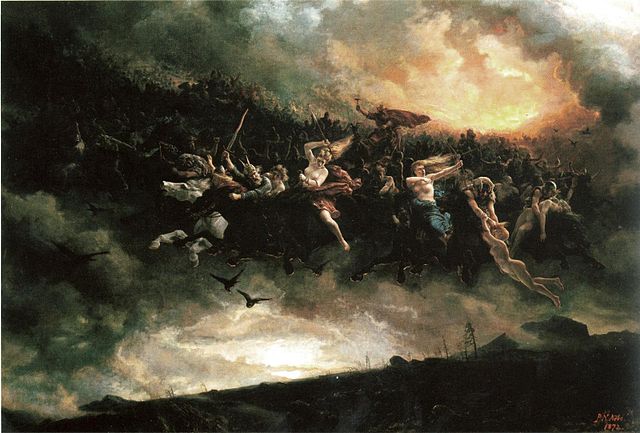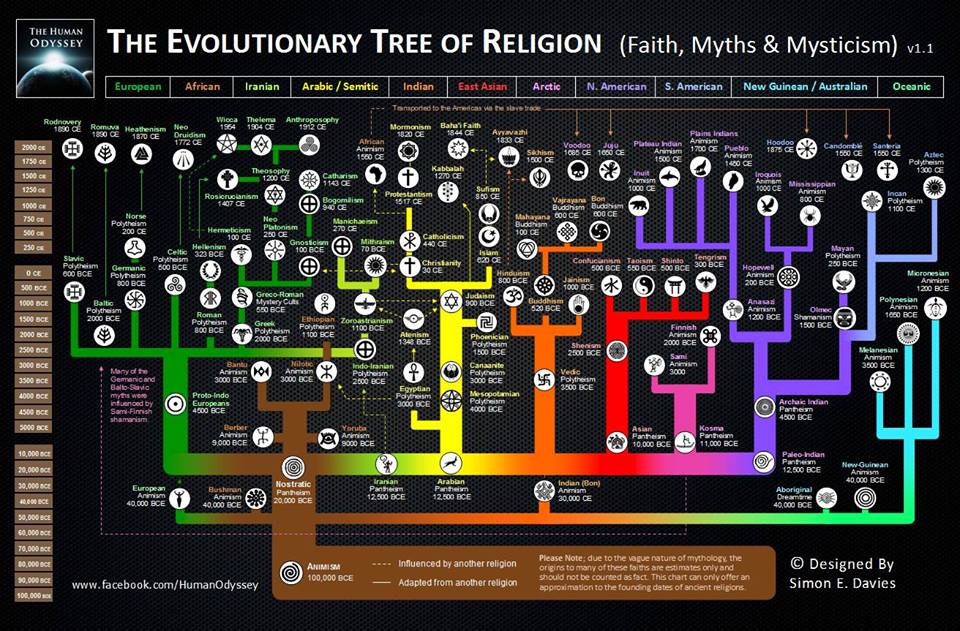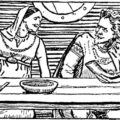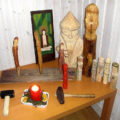
Soft Polytheism versus Hard Polytheism in Heathenry
Apparently, I struck a chord with some of my readers when talking about soft polytheism versus hard polytheism. I assumed many of my readers were soft polytheistic, that is, looking at the gods as archetypes and forces of nature, and not necessarily physical beings. Apparently, I was wrong. Many of my readers do indeed look at the gods as physical beings.
Some Caveats About Beliefs
Before I get into the whole soft polytheism versus hard polytheism arguments, I need to reiterate my beliefs here. As I’ve said previously, I tend toward a soft polytheistic belief of archetypes. However, given that I have dealt with the gods directly, I believe that the gods can take human-like forms. (They are, after all, gods.) I also believe that our gods go by many names and manifestations, but they are the same gods. At least, in this Universe.
How Far Down the Rabbit Hole Do You Want to Go?
Having said that, I don’t necessarily have an issue with your beliefs if you want to go the hard pagan route. It’s just I know that proving the stories we tell in the face of science gets to be difficult at best. Unless you really believe that our world hangs off of a physical tree and humans were carved from wood, I don’t think you and I will have much to argue about. If you want to go down that rabbit hole and believe everything in our stories is 100 percent true, despite science proving it isn’t, I suggest you go in your corner and maybe find some Christian fundamentalist friends to argue with. What you believe isn’t logical and I won’t be able to convince you to the contrary.
Hard Polytheism
If you’re a hard polytheist in the strictest sense, you tend to accept our stories at face value. That the  Moon and the Sun move across our sky, rather than the Earth revolving around the Sun and the Moon revolving around the Earth. That there really was a cow that licked the brine from Ymir and the gods, thus creating the first pantheons. That Odin along with his brothers slew Ymir and fashioned our Earth from Ymir’s bones. This is more fundamentalist than anything, and again, since you really believe that, nothing I’m going to tell you is going to make a difference.
Moon and the Sun move across our sky, rather than the Earth revolving around the Sun and the Moon revolving around the Earth. That there really was a cow that licked the brine from Ymir and the gods, thus creating the first pantheons. That Odin along with his brothers slew Ymir and fashioned our Earth from Ymir’s bones. This is more fundamentalist than anything, and again, since you really believe that, nothing I’m going to tell you is going to make a difference.
I would bet, however, that most hard polytheistic Heathens are a mix of this hard polytheism and soft polytheism. You like the creation tales, but you at least accept the current explanation of how the Universe came into being. Maybe you’ve resolved that in your minds, and maybe you haven’t. Maybe you just don’t know what to believe.
Blending Myth and Fact
 Now, if you believe our gods manifest themselves in physical forms, that’s fine. I’m good with that. I believe that they can and do, but I also don’t believe that Asgard exists in our dimension. I tend to accept string theory as well, which if our gods exist in physical forms, they possibly occupy more than the three dimensions we live in. In this case, we may have a tough time seeing them. It could just be that our wights may also inhabit those dimensions, affecting our existence without necessarily seeing them in their full forms.
Now, if you believe our gods manifest themselves in physical forms, that’s fine. I’m good with that. I believe that they can and do, but I also don’t believe that Asgard exists in our dimension. I tend to accept string theory as well, which if our gods exist in physical forms, they possibly occupy more than the three dimensions we live in. In this case, we may have a tough time seeing them. It could just be that our wights may also inhabit those dimensions, affecting our existence without necessarily seeing them in their full forms.
With the exception of some clueless wankers, most people believe the Earth is round, that it revolves around the Sun, and that stars are simply other suns, some very much like our own sun. Our sun is a relatively ordinary star, too, with the exception that it is the only solar system we know of that has life. That may change because not only are there are trillions of stars, but there are galaxies with trillions of stars in them. The Earth formed some 4.54 billion years ago and not 6000 years like the new Earth creationists would have you believe. I’m pretty sure that the formation of Earth wasn’t from a frost giant named Ymir, unless you’re willing to believe that Ymir’s bones were some primordial matter that came from the death of another star. Given that our star is a second or even third generation star, we can look at the stories and deduce that maybe our creation stories are one big metaphor. Or maybe they’re just a way for people to explain how things came into being.
Whence Our Religion Came 
Heathenry is a product of our ancestors combined with communication with our gods and curiosity about our world. It came from a more ancient religion that our Proto-Indo-European ancestors worshiped. Those ancestors’ predecessors practiced a form of animism. The interesting question is when our gods revealed themselves to our ancestors.
I would argue that given the overall similarities of certain religions, we have to assume a Jungian collective unconscious was passed down throughout history. No matter how different other ethnicities seem, they have similar stories that run throughout their folklore. To a certain degree, one could argue that it is because our brains are wired the same, and I’m not going to dispute that. But I do suspect that all our ancestors had a shared experience at one time. Think about it. We know that humans nearly went extinct at least twice. Could this be the time when our gods stepped in to help us?
That, of course, is purely speculation on my part. I have no clue if that really did happen, but it does make for some interesting ideas.
But I digress…
Getting Back on Track
 Soft polytheism tends to look more at the concepts of the gods as archetypes. In it’s extreme form, it’s closer to atheism than a religion. I would not consider most soft polytheists in that group. Many are pantheists, which allows the worship of other gods, and it equates the universe with the gods. I sit more comfortably in the pantheistic version of Heathenry, because I believe that the universe and the gods are the same. My belief is our gods go by other names in other religions. I chose our gods not only because I am most comfortable with them, but because I have had interactions with them by those names.
Soft polytheism tends to look more at the concepts of the gods as archetypes. In it’s extreme form, it’s closer to atheism than a religion. I would not consider most soft polytheists in that group. Many are pantheists, which allows the worship of other gods, and it equates the universe with the gods. I sit more comfortably in the pantheistic version of Heathenry, because I believe that the universe and the gods are the same. My belief is our gods go by other names in other religions. I chose our gods not only because I am most comfortable with them, but because I have had interactions with them by those names.
I hope I’ve given you something to think about. Let me know your beliefs in the comments.




2 thoughts on “Soft Polytheism versus Hard Polytheism in Heathenry”
Sorry for commenting on an old post ?
I’m a hard polytheist, but I’ve never heard hard polytheism described in this way, so I thought you might be interested in learning a different way in which it’s used!
I know many hard polytheists, and none of them are mythic literalists (myself included). I use the term to mean viewing all of the deities as separate, individual entities; ie, Zeus is not the same god as Thor or Odin, Jupiter is not the same god as Zeus, The Dagda isn’t the same god as Odin, so on and so forth. (I’ve only ever seen the term used in this way, so I thought your article was quite interesting). To me and everyone I’ve met who uses the term, it doesn’t mean viewing the gods as physical, material beings, or the myths as being literal; it simply means we view the Gods as distinct from one another.
And I’m glad I’ve learned a new way soft polytheism is used; what you describe as your beliefs I’ve seen called atheopaganism (and also soft polytheism).
A different definition of soft polytheism doesn’t have anything to do with the gods being metaphors, but is simply the belief that the gods are not separate, individual entities; Jupiter, Zeus, and Odin/Thor, etc are all the same god, just appearing with different names;
Thank you for your comments. I’ve heard of soft polytheism as that way too, but I think it’s more pantheism. Your opinion on that?